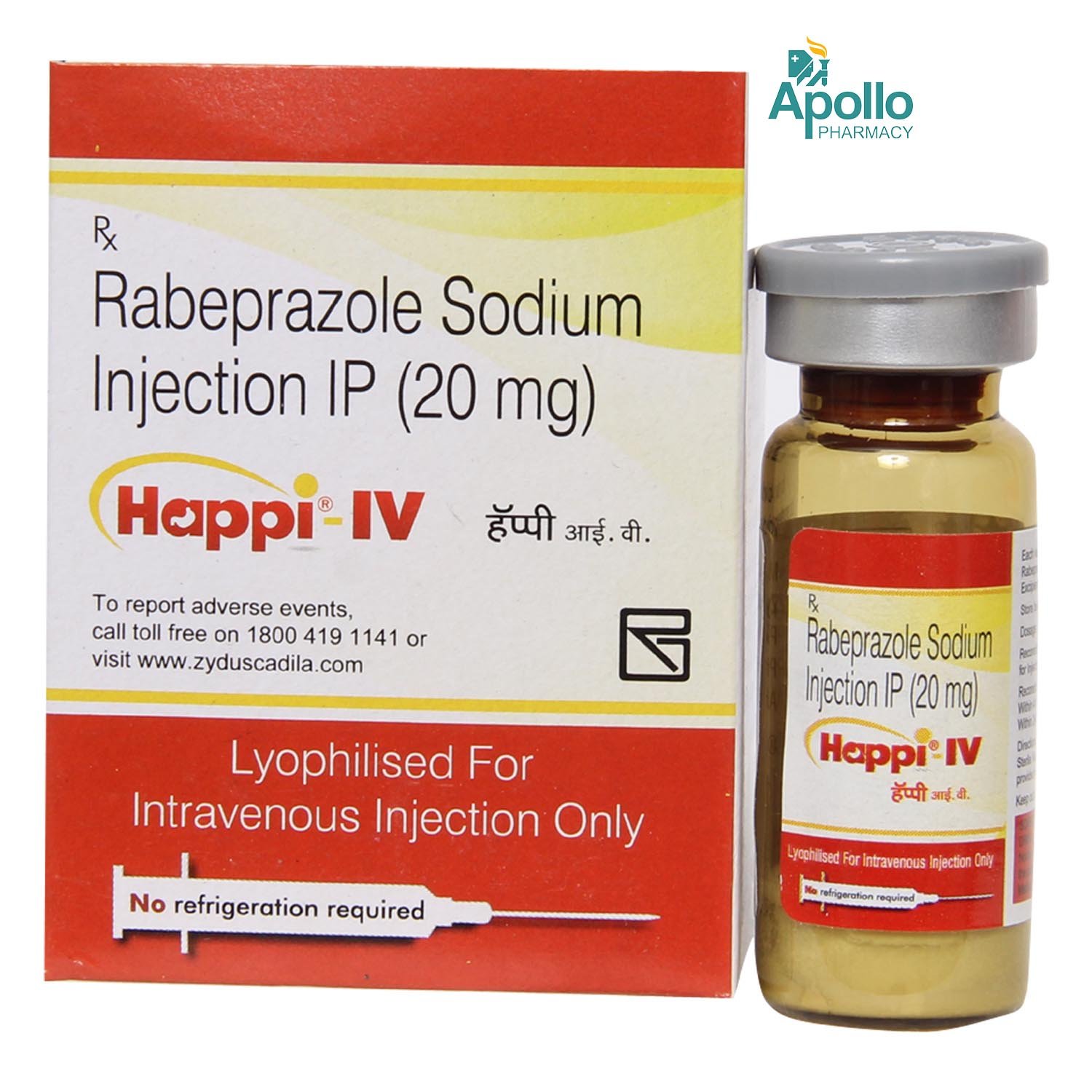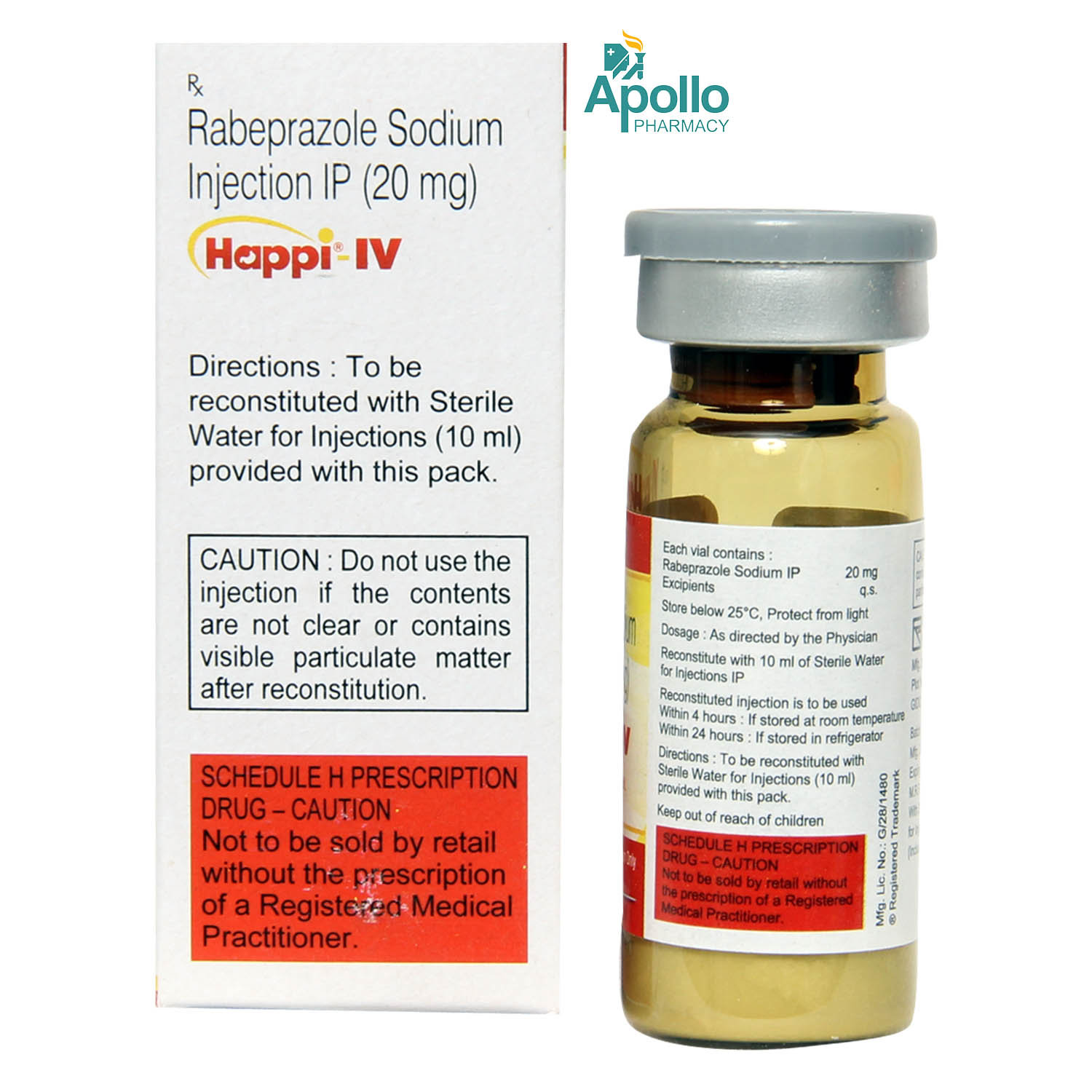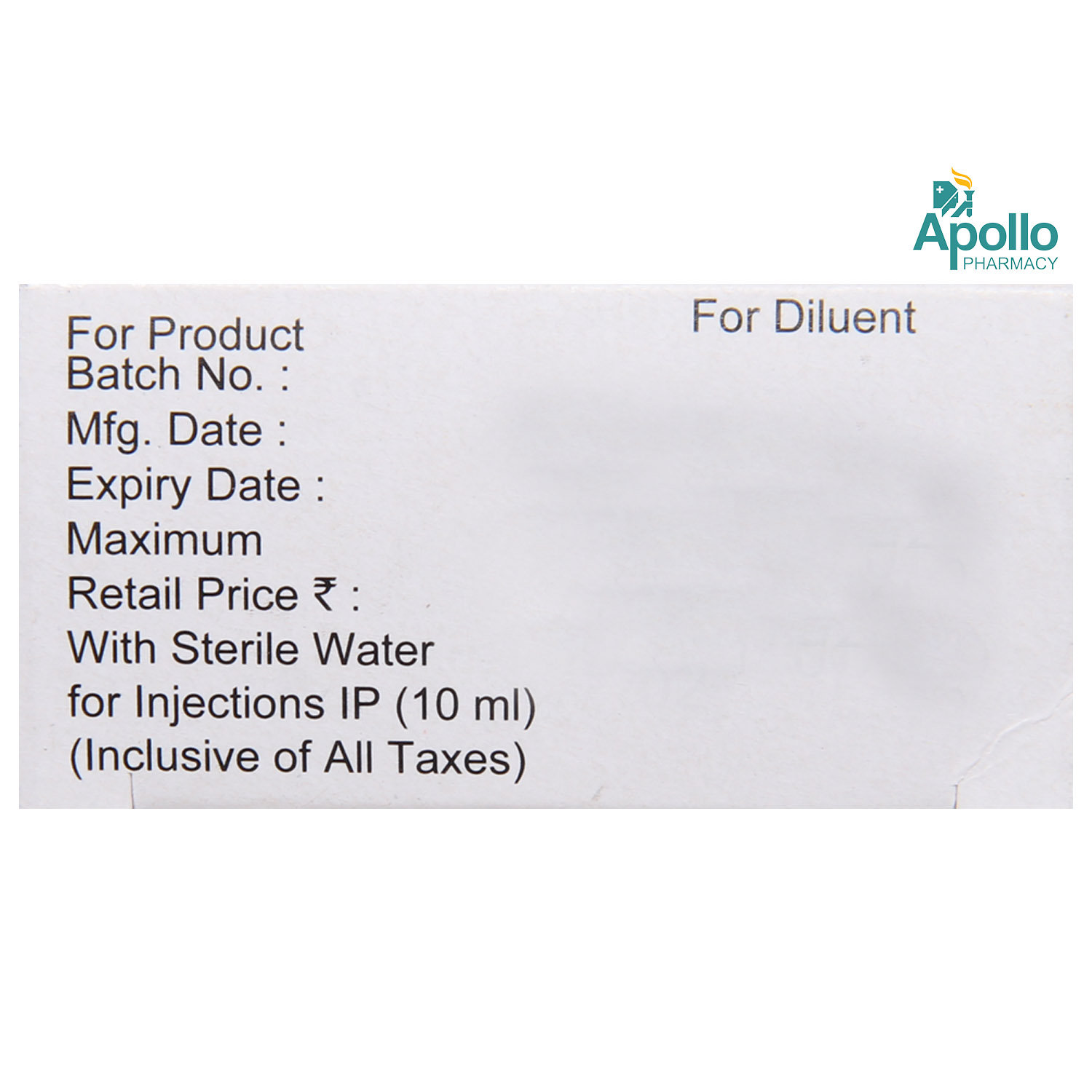HAPPI 20MG I.V INJECTION
MRP ₹167
(Inclusive of all Taxes)
₹25.1 Cashback (15%)
Provide Delivery Location
Online payment accepted
 Prescription drug
Prescription drugWhats That
Composition :
Manufacturer/Marketer :
Consume Type :
Expires on or after :
Return Policy :
About HAPPI 20MG I.V INJECTION
HAPPI 20MG I.V INJECTION belongs to a group of antiulcer medicines called proton pump inhibitors used to treat gastric/duodenal ulcers, gastro-oesophageal reflux disease (GERD), heartburn, prevention of acid-aspiration, stress-induced mucosal injury, and Zollinger-Ellison syndrome.
HAPPI 20MG I.V INJECTION contains 'Rabeprazole' that works by blocking the action of the enzyme known as gastric proton pump which is responsible for the production of acid. This helps in reducing the amount of acid produced, heals the ulcers and prevents the formation of new ulcers.
In some cases, you may experience certain common side-effects such as pain at the site of injection, diarrhoea, dizziness, dry mouth, headache, and abdominal pain. Most of these side-effects do not require medical attention and will resolve gradually over time. However, you are advised to talk to your doctor if you experience these side-effects persistently.
On long-term treatment, HAPPI 20MG I.V INJECTION may cause low magnesium levels, vitamin B12 levels and increase the risk of bone fractures. Consult your doctor if you are pregnant or breastfeeding. HAPPI 20MG I.V INJECTION may cause dizziness, so drive only if you are alert. HAPPI 20MG I.V INJECTION is not recommended for children as safety has not been established. Avoid consuming alcohol along with HAPPI 20MG I.V INJECTION as it could lead to increased drowsiness and can elevate the production of stomach acid.
Uses of HAPPI 20MG I.V INJECTION
Directions for Use
Key Benefits
HAPPI 20MG I.V INJECTION belongs to a group of antiulcer medicines called proton pump inhibitors. HAPPI 20MG I.V INJECTION is used to treat gastric ulcers, duodenal ulcers, gastro-oesophageal reflux disease (GERD), heartburn, prevention of acid-aspiration, stress-induced mucosal injury, and Zollinger-Ellison syndrome. HAPPI 20MG I.V INJECTION works by blocking the action of the enzyme known as gastric proton pump that is responsible for the production of acid. This helps in reducing the amount of acid produced, heals the ulcers and prevents the formation of new ulcers.
Storage
- Hydrate your body: Drink enough water to prevent dehydration and headaches.
- Calm Your Mind: Deep breathing and meditation can help you relax and relieve stress.
- Rest and Recharge: Sleep for 7-8 hours to reduce headache triggers.
- Take rest: lie down in a quiet, dark environment.
- Cold or warm compresses can help reduce tension.
- Stay Upright: Maintain good posture to keep symptoms from getting worse.
- To treat headaches naturally, try acupuncture or massage therapy.
- Over-the-counter pain relievers include acetaminophen and ibuprofen.
- Prescription Assistance: Speak with your doctor about more substantial drug alternatives.
- Severe Headaches: Seek emergency medical assistance for sudden, severe headaches.
- Frequent Headaches: If you get reoccurring headaches, consult your doctor.
- Headaches with Symptoms: Seek medical attention if your headaches include fever, disorientation, or weakness.
- Inform your doctor about your constipation symptoms. They may adjust your medication or advise alternative treatments.
- Stay hydrated by drinking sufficient of water (at least 8-10 glasses a day) to help soften stool and promote bowel movements.
- Increase fibre intake by eating foods high in fibre, such as fruits, whole grains, vegetables and legumes, to help bulk up the stool.
- Establish a bowel routine by trying to go to the bathroom at the same time each day to train your bowels.
- Engaging in regular exercise, like walking or yoga, can support in bowel movement stimulation.
- Consult your doctor if constipation persists, and discuss alternative treatments or adjustments to your medication.
- Inform Your Doctor: Notify your doctor immediately about your diarrhoea symptoms. This allows them to adjust your medication or provide guidance on managing side effects.
- Stay Hydrated: Drink plenty of fluids to replace lost water and electrolytes. Choose water, clear broth, and electrolyte-rich drinks. Avoid carbonated or caffeinated beverages to effectively rehydrate your body.
- Follow a Bland Diet: Eat easy-to-digest foods to help firm up your stool and settle your stomach. Try incorporating bananas, rice, applesauce, toast, plain crackers, and boiled vegetables into your diet.
- Avoid Trigger Foods: Steer clear of foods that can worsen diarrhoea, such as spicy, fatty, or greasy foods, high-fibre foods, and dairy products (especially if you're lactose intolerant).
- Practice Good Hygiene: Maintain good hygiene to prevent the spread of infection. To stay healthy, wash your hands frequently, clean and disinfect surfaces regularly, and avoid exchanging personal belongings with others.
- Take Anti-Diarrheal Medications: If your doctor advises, anti-diarrheal medications such as loperamide might help manage diarrhoea symptoms. Always follow your doctor's directions.
- Keep track of your diarrhoea symptoms. If they don't get better or worse or are accompanied by severe stomach pain, blood, or dehydration signs (like extreme thirst or dark urine), seek medical help.
- Tell your doctor about your GAS symptoms. They may change your medication regimen or prescribe additional drugs to help you manage them.
- To manage GAS symptoms, eat a balanced diet of fibre, vegetables, and fruits.
- Drink enough water throughout the day to avoid constipation and treat GAS symptoms.
- Regular exercise like yoga and walking may help stimulate digestion and alleviate GAS symptoms.
- Take probiotics only if your doctor advises, as they may help alleviate GAS symptoms by promoting gut health.
- Take medication for GAS symptoms only if your doctor advises, as certain medications can interact with your existing prescriptions or worsen symptoms.
- If symptoms persist, worsen, or are accompanied by severe abdominal pain, vomiting, or bleeding, seek immediate medical attention.
- Apply a hot/cold pack to the affected area.
- Doing gentle exercises can help cope with pain by stretching muscles.
- Get enough sleep. It helps enhance mood and lower pain sensitivity.
- Avoid alcohol, smoking and tobacco as they can increase pain.
- Follow a well-balanced meal.
- Meditation and massages may also help with pain.
- Drink warm fluids such as warm water with honey, broth, soup or herbal tea to soothe sore throat.
- Gargle with warm salt water.
- Suck on lozenges to increase the production of saliva and soothe your throat.
- Use a humidifier to soothe sore throat as it adds moisture to the air and makes breathing easier.
- Drink water or other clear fluids.
- To prevent worsening of pain, limit intake of tea, coffee, or alcohol.
- Include bland foods like rice, toast, crackers, and rice in your diet.
- Avoid lying down immediately after eating as it may cause indigestion or heartburn.
- Avoid acidic and spicy food as it may cause indigestion.
Drug Warnings
Do not take HAPPI 20MG I.V INJECTION if you are allergic to any of its contents. Inform your doctor if you have a stomach tumour, liver disease, or if you are due to have Chromogranin A blood test. On long-term treatment, HAPPI 20MG I.V INJECTION may cause low magnesium levels, vitamin B12 levels, and increase the risk of bone fractures; the doctor may advise regular tests for monitoring your condition. Consult your doctor before starting HAPPI 20MG I.V INJECTION if you are pregnant or breastfeeding. HAPPI 20MG I.V INJECTION may cause dizziness, so drive only if you are alert. HAPPI 20MG I.V INJECTION is not recommended for children as safety has not been established. Avoid consuming alcohol along with HAPPI 20MG I.V INJECTION as it could lead to increased drowsiness and can elevate the production of stomach acid. Keep your doctor informed about your health condition and medicines to rule out any side-effects.
Drug-Drug Interactions
Drug-Drug Interactions
Login/Sign Up
When used in combination with erlotinib, Happi 20mg I.v Injection may prevent the absorption of erlotinib into the circulation, which might make erlotinib less effective in treating cancer.
How to manage the interaction:
Taking Happi 20mg I.v Injection with Erlotinib is not recommended as it can result in an interaction, it should be taken only if a doctor has advised it. Do not stop using any medications without consulting a doctor.
Co-administration of Happi 20mg I.v Injection can make Rilpivirine less effective by reducing its absorption in the body.
How to manage the interaction:
Taking Happi 20mg I.v Injection with Rilpivirine is not recommended, but can be taken if prescribed by the doctor. Do not discontinue the medications without consulting a doctor.
When Phenytoin and Happi 20mg I.v Injection are taken in combination, Phenytoin will reduce the concentration or impact of Happi 20mg I.v Injection.
How to manage the interaction:
Although taking Phenytoin and Happi 20mg I.v Injection together can result in an interaction, it can be taken if a doctor has prescribed it. Do not discontinue any medications without a doctor's advice.
Taking Happi 20mg I.v Injection together with Acalabrutinib results in a decreased effectiveness of Acalabrutinib.
How to manage the interaction:
Although taking Happi 20mg I.v Injection and Acalabrutinib together can result in an interaction, it can be taken if a doctor has prescribed it. Do not discontinue any medications without a doctor's advice.
Taking Happi 20mg I.v Injection together with Gefitinib results in decreased levels of gefitinib in your blood. This can result in a decreased effectiveness of gefitinib in treating the disease.
How to manage the interaction:
Although taking Happi 20mg I.v Injection and Gefitinib together can possibly result in an interaction, it can be taken if your doctor has prescribed it. To lessen the effects of the interaction, it is advised that you take gefitinib 12 hours before or 12 hours after Happi 20mg I.v Injection. Do not discontinue any medications without a doctor's advice.
Taking Happi 20mg I.v Injection together with Dasatinib results in decreased levels of Dasatinib and its effectiveness.
How to manage the interaction:
Although taking Happi 20mg I.v Injection and Dasatinib together can result in an interaction, it can be taken if a doctor has prescribed it. Do not discontinue any medications without a doctor's advice.
Co-administration of Atazanavir's blood levels and absorption can both be affected by Happi 20mg I.v Injection, which decreases the atazanavir's ability to treat HIV.
How to manage the interaction:
Although taking Happi 20mg I.v Injection and atazanavir together can result in an interaction, it can be taken if a doctor has prescribed it. Do not discontinue any medications without a doctor's advice.
When Happi 20mg I.v Injection and Idelalisib are taken in combination, Idelalisib may increase the level or impact of Happi 20mg I.v Injection.
How to manage the interaction:
Although taking Happi 20mg I.v Injection and Idelalisib together can result in an interaction, it can be taken if a doctor has prescribed it. Do not discontinue any medications without a doctor's advice.
Co-administration of Methotrexate with Happi 20mg I.v Injection can increase the blood levels and side effects of Methotrexate.
How to manage the interaction:
Although there is a possible interaction between Happi 20mg I.v Injection and Methotrexate, you can take these medicines together if prescribed by a doctor. Do not stop using any medications without consulting a doctor.
Taking Clopidogrel with Happi 20mg I.v Injection can reduce the effectiveness of Clopidogrel.
How to manage the interaction:
Taking Clopidogrel and Happi 20mg I.v Injection together possibly has an interaction, but you can take these medications together if a doctor has advised it. Do not stop using any medications without talking to a doctor.
Drug-Food Interactions
Drug-Food Interactions
Login/Sign Up
Diet & Lifestyle Advise
- Eat smaller meals more often.
- Avoid smoking and alcohol consumption. Alcohol intake leads to increased production of stomach acid, thereby increasing acidity and heartburn.
- Maintain a healthy weight by regular exercising.
- Avoid lying down after eating to prevent acid reflux.
- Avoid tight-fitting clothes as it might increase the pressure on the abdomen leading to acid reflux.
- Practise relaxation techniques and avoid stress by doing yoga or meditation.
- Avoid foods such as high-fat food, spicy food, chocolates, citrus fruits, pineapple, tomato, onion, garlic, tea and soda.
- Avoid sitting continuously as it may trigger acidity. Take a break of 5 minutes every hour by doing brisk walking or stretching.
Side Effects of HAPPI 20MG I.V INJECTION
- Pain at the site of injection
- Diarrhoea
- Dry mouth
- Dizziness
- Headache
- Abdominal pain
Habit Forming
Therapeutic Class
All Substitutes & Brand Comparisons
RX
RABICIP I.V INJECTION 5 ml
Cipla Ltd
₹142.5
(₹25.66/ 1ml)
82% CHEAPERRX
Out of StockDouxrab I.V. 20mg Injection
₹49
(₹44.1 per unit)
70% CHEAPERRX
Out of StockEbarol IV 20mg Injection
₹51
(₹45.9 per unit)
69% CHEAPER
Author Details
We provide you with authentic, trustworthy and relevant information
Drug-Diseases Interactions
Drug-Diseases Interactions
Login/Sign Up
FAQs
Drug-Drug Interactions Checker List
- ATAZANAVIR
- KETOCONAZOLE
- ITRACONAZOLE
- METHOTREXATE
Special Advise
- Inform your doctor before taking HAPPI 20MG I.V INJECTION if you are due to have Chromogranin A blood test.
- HAPPI 20MG I.V INJECTION may cause abnormal blood and liver enzyme values. Inform the person doing the tests that you are taking HAPPI 20MG I.V INJECTION.
- HAPPI 20MG I.V INJECTION may increase the risk of infections. Consult your doctor if you notice any signs or symptoms of infections.
Disease/Condition Glossary
Acidity: The stomach is usually protected from the acid by a mucous layer. In some cases, due to excess acid production, the mucous layer gets eroded, which leads to complications like acidity, GERD, heartburn, peptic ulcer, and Zollinger Ellison syndrome.
Gastroesophageal reflux disease (GERD): It is a condition that occurs when stomach acid frequently flows back into the food pipe (oesophagus). This backflow (acid reflux) irritates the food pipe and causes heartburn.
Gastric/duodenal ulcer: It is a painful condition followed by the development of sores or ulcers in the duodenum or stomach lining.
Zollinger Ellison syndrome: It is a rare condition in which a gastrin-secreting tumour of the pancreas causes excessive acid production leading to peptic ulcers.

Have a query?
Alcohol
Safe if prescribed
Avoid consumption of alcohol while taking HAPPI 20MG I.V INJECTION. Alcohol intake leads to increased production of stomach acid, thereby increasing acidity and heartburn.
Pregnancy
Consult your doctor
Please consult your doctor if you are pregnant. Your doctor will weigh the benefits and any potential risks before prescribing HAPPI 20MG I.V INJECTION.
Breast Feeding
Consult your doctor
Please consult your doctor if you are breastfeeding. Your doctor will decide if HAPPI 20MG I.V INJECTION can be taken by breastfeeding mothers or not.
Driving
Safe if prescribed
HAPPI 20MG I.V INJECTION may cause dizziness. Do not drive or operate machinery unless you are alert.
Liver
Consult your doctor
Please consult your doctor if you have a liver impairment or any concerns regarding this.
Kidney
Consult your doctor
Please consult your doctor if you have kidney impairment or any concerns regarding this.
Children
Safe if prescribed
HAPPI 20MG I.V INJECTION is not recommended for children as the safety and effectiveness were not established.











_0.jpg?tr=q-85)

